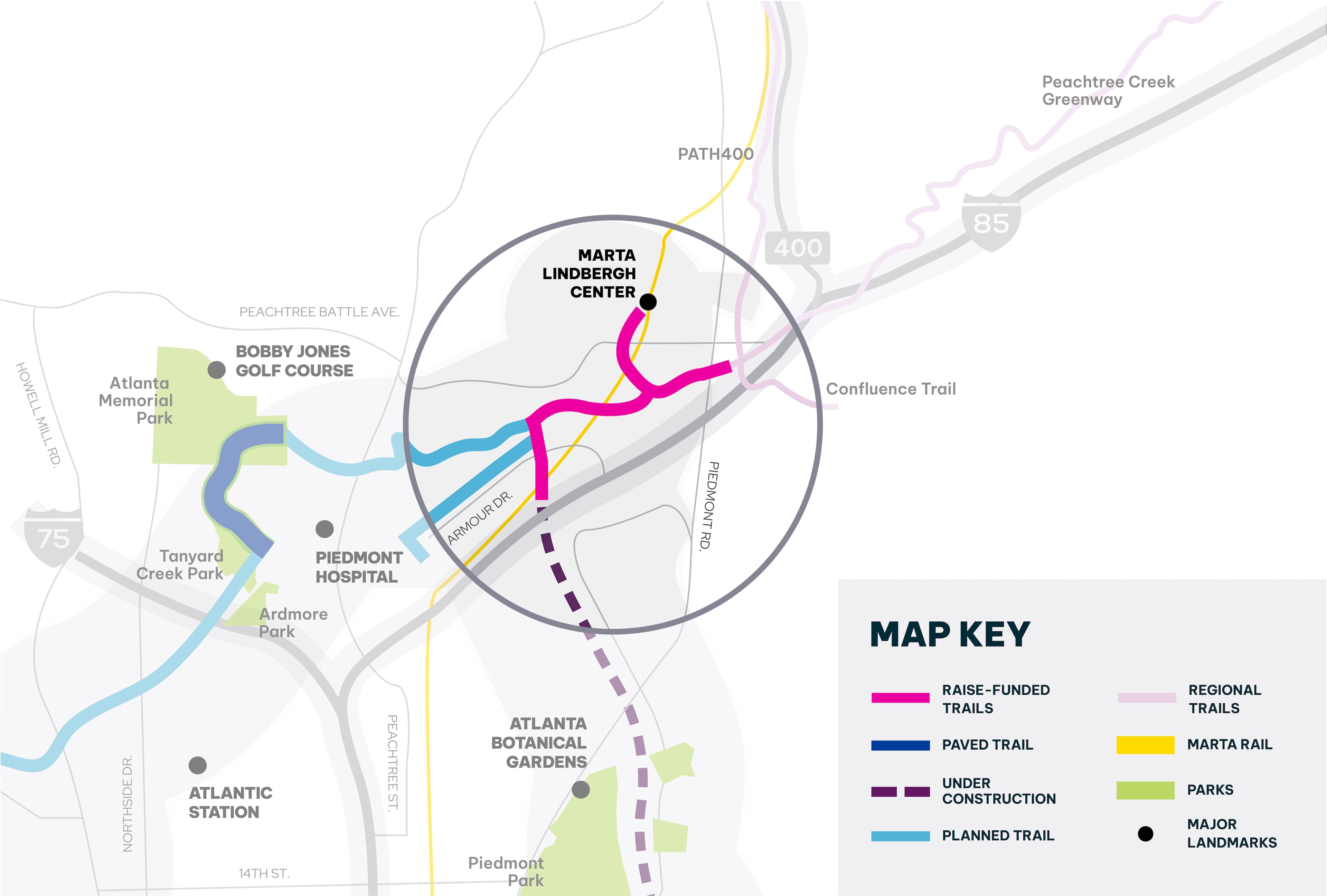Trump grant rollbacks threaten $330M for metro Atlanta projects

More than half of the $550 million in federal funding awarded to the metro Atlanta region for infrastructure projects like the Stitch and the Beltline is up in the air as local leaders brace for potential Trump administration grant rollbacks.
When former President Joe Biden was in office, Atlanta and its surrounding cities were promised large amounts of funding under a sweeping bipartisan infrastructure package passed in 2021.
Those dollars went toward proposals that focused on pedestrian safety, bicycle lane upgrades, green and equitable infrastructure projects and electric vehicle programs.
But the Atlanta Regional Commission estimates that more than $330 million in competitive grants awarded across the metro area are at risk after federal transportation officials announced in March that they planned on reevaluating awards.
That’s just under 60% of the total amount of funds given to Atlanta since 2021.
The at-risk funding includes around $150 million toward the first phase of the ambitious Stitch project that would build a 14-acre retail and green space over the Downtown Connector. The park is aimed at reconnecting Atlanta neighborhoods and boosting economic development in the heart of the city.
The project is anticipated to cost $713 million with construction set to begin at the end of 2026.
Central Atlanta Progress, the influential civic group and downtown business coalition, overseeing the Stitch said in a statement that the project is still moving forward into the design and pre-construction phases with funding that’s already been allocated.
“Despite potential federal funding rollback of similar projects across the country, we feel confident in the path forward for the Stitch,” the organization said.

Other grants that could be lost are $25 million for the Beltline Northeast Trail, $65 million to connect the Flint River Trail to the Beltline and $30 million for the Central and Pryor safe streets project.
Under President Donald Trump’s administration, the U.S. Department of Transportation issued a memo in March rescinding Biden-era programs passed by Congress four years ago.
U.S. Transportation Secretary Sean P. Duffy said in a statement that the agency is “getting back to basics.”
“The previous administration flouted Congress in an attempt to push a radical social and environmental agenda on the American people,” he said.
At the same time, the department announced it was launching a review of competitive grants doled out to projects across the country that have yet to receive full funding.
The potential loss of funding means an uncertain future even for projects such as the Flint River Trail connector to the Beltline, which is being managed by the Atlanta Regional Commission and was in the final stage of completing the financial agreement before Trump took office.

Clyde Higgs, president and CEO of Atlanta Beltline Inc., said in a statement that they are currently “working with our partners to assess the impact of the federal delays.”
“We look forward to working with Secretary Duffy and the team to execute an updated grant agreement,” Higgs said.
Other roadway revamps like Centennial Yards complete streets in Atlanta, Scott Boulevard complete street in Decatur and Dallas Road crossing closure in Powder Springs are on the ARC’s list of projects at-risk of losing federal funds.
Atlanta Department of Transportation Commissioner Solomon Caviness told Atlanta City Council members he and other transportation officials from across the country are headed to the nation’s Capitol to advocate for the promised funds.
“There are conversations now with our representatives in Washington — and even locally — to make sure that we stay on top of the situation in Washington,” he said during the department’s budget hearing on Tuesday.
“We’re going to do everything in our power to try to have those funds released,” Caviness said.
The rollbacks would also impact safety planning in Chattahoochee Hills, East Point, Fairburn, Lilburn, Norcross and Coweta and DeKalb counties.
Brittney Kohler, legislative director of transportation and infrastructure services for the National League of Cities, said that cities are usually years into planning and ready to start construction by the time they are awarded grant money.
“We’ve been waiting for about 100 days for there to be movement with these grants being released,” she said. “But we’re far from getting everyone to a grant agreement.”
Delayed projects inevitably cost more because of inflation — and now tariffs, she said.
“Not only could the federal government harm these projects by pulling back necessary funds, but there’s a certain point where even waiting becomes so costly,” Kohler said. “And the federal dollar that’s been given won’t have the same amount of value.”

Atlanta City Council passed Vision Zero legislation in 2020, requiring the city’s transportation department to prioritize safety when completing road projects.
But local leaders recently have increased calls for safety upgrades like better sidewalks and clearer crosswalks throughout the city after a string of downtown pedestrian fatalities. Two people have been fatally struck by cars crossing Peachtree Street within the past four months.
City Council member Matt Westmoreland called the Atlanta Regional Commission’s estimate of at-risk funds “incredibly alarming and deeply troubling.”
“My colleagues and I on council have been very focused on bringing the kind of bicycle and pedestrian improvements that will make Atlanta a safer place to move around,” he said. “And the Stitch project specifically has the ability to absolutely transform a very empty part of town.
“I am very hopeful that all of these grants will move forward. And I know that the city will do everything within its political and legal power to make sure they do.”



